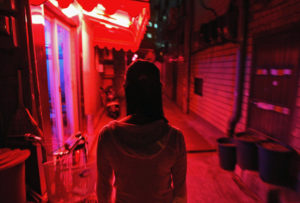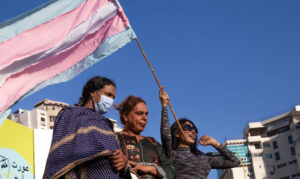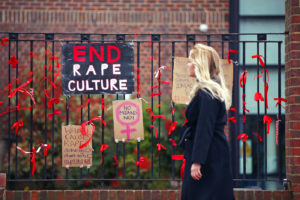The first time Rahim* was raped by a family member, he was six years old. In the early Nineties, three of Rahim’s uncles immigrated from Pakistan to the small town in Southern Ontario, Canada where Rahim’s family lived. He was five years old at the time; his elder sisters were nine and 14, and his baby brother was a new-born. The sexual abuse started almost immediately. Rahim says he was raped by one of his uncles “extremely frequently” for five years: two to three times a week, every week. His sisters weren’t spared either.
When he was eight, Rahim told one of his sisters that he had seen their uncle naked on numerous occasions. Both of them realised that they, along with their other sister, were being sexually abused after their daily Quran class with him. “Each day he’d pick who gets to leave and who gets to stay,” Rahim says. “I got the worst of it.”
In the liberal West, just implying that Pakistani communities have high rates of child sexual abuse (CSA) can result in accusations of bigotry. The subject is even more unmentionable in Pakistan itself. The nation has one of the highest rates of child sexual abuse in the world: over half a million children are raped there every year. (That is a conservative estimate.) According to recent reports, children are most at risk from the age of six, with nine being the most common age to be raped.
As the grooming gang scandals erupting in the UK have shown, this permissive attitude towards CSA seems to be spreading. A new documentary by GBNews attempts to uncover why the abuse scandal in Rotherham — in which more than 1,500 underage, often impoverished, white girls were groomed and raped by gangs of Pakistani men — was allowed to go on for decades without the authorities intervening. One obvious reason is that these authorities were afraid of being seen as “racist” for focusing the investigation on the predominantly Pakistani men who are running these rings. But it’s equally important to recognise that these crimes were covered up by the Pakistani community itself, which allowed abusers to continue with impunity. The documentary shows how Pakistani-British policemen and Rotherham city counsellors either tried to suppress reports about the scandal, or deny it was happening at all.
To reject the uncomfortable truth is the modus operandi in Pakistan, where more than 12 children are reported to be sexually abused every day. In the tight-knit, working-class communities where it’s most likely to take place, fear of bringing “shame” on the family is prioritised over safeguarding individuals, even if they’re children. A conservative attitude towards discussing topics of a sexual nature doesn’t help. A 2013 report by Save The Children offers an insight into how family dynamics play out when CSA is uncovered in Pakistan, where its prevalence “appears to be high”. Of the 99% of mothers in Pakistan who were aware of CSA, around one-fifth either considered children as compliant, or blamed them for the abuse. Confronted with the grizzly details of such crimes, it is common for Pakistanis to downplay their severity, with men often seeing it as “a part of life”, to use the report’s phrase.
In Rahim’s family, when the eldest sister finally told their mother that an uncle had regularly raped three of the four children in the house, Rahim’s mother didn’t believe her, instead accusing her of “being hysterical and dramatic”. When her siblings insisted that the abuse was, in fact, happening, their mother finally confronted the uncle — but didn’t mention it to Rahim’s father, a marine engineer who was away from home for up to 10 months of the year. The uncle apologised, and the abuse stopped — but just for a few months. It was only when the uncle got married and moved out that the children’s five-year ordeal finally came to an end. By then, Rahim says, the eldest sister’s “problems started manifesting because of the trauma and she started rebelling”, eventually running away from home and telling the authorities about the abuse. When Rahim’s father was told, he didn’t believe any of it was true.
We have to recognise that these attitudes are cultural, if we are to understand what happened in Rotherham. Mohammed Shafiq, chief executive of The Ramadhan Foundation UK, has often commented on the over-representation of Pakistani men involved in grooming gangs in the West: “They think that white teenage girls are worthless and can be abused without a second thought.” In communities where parents are willing to sacrifice their own children in order to “keep the peace”, it’s rare for anyone to stick their neck out to speak up for the rights of poor and vulnerable white girls, who are considered outsiders. The general attitude seems to be: those non-Muslim “white slags” had it coming.
Predators exploit the high-trust environment enjoyed by citizens in more developed nations, such as the UK and Canada. Girls outside the Pakistani community are more accessible to predators because they have greater social freedom; the most accessible are those without reliable carers. One of the eeriest moments in the documentary was when a victim of the grooming gangs described what happened to her as “normal”. The sexual abuse of young girls like her was so commonplace in these towns, they didn’t think it was unusual to be drugged, gang raped, and trafficked by young men who passed themselves off as the girls’ boyfriends. Is this what a multicultural society is supposed to tolerate under the guise of “social cohesion”?
Unfortunately, the Pakistani community is still not ready to talk about CSA — a fact recognised by those few British Pakistanis who have spoken out against it. Shame and honour codes hold too much power, and those codes are hard to change. Shafiq, of The Ramadhan Foundation, notes that “for years some British Pakistanis have deliberately buried their heads in the sand about these predatory grooming gangs”. When family members of perpetrators were interviewed, they described white girls as “filthy”, commenting on their clothing, and saying, “they have no shame, no fear of Allah”. When asked how she would feel if her own daughter were abused, the Pakistani wife of one of the predators replied: “It can’t happen to our children because they are not in the streets. We look after them.”
When Rahim’s uncle was finally arrested, following the revelation that he had abused other children in the neighbourhood, the Pakistani community came together to do damage control. By this point, the abuser had two young children of his own. Rahim’s parents were advised by other Pakistani immigrants not to talk about his crimes because “they didn’t want the family’s image to be tarnished in the community”. They put pressure on Rahim to write a letter to the judge asking for a lighter sentence, their logic being that his cousins shouldn’t be made to grow up without a father.
“I was young at the time,” Rahim reflects. “I just did whatever the adults told me to do, so I wrote it.” His uncle went to prison for two years. When he was released, he and his family moved to Alberta. “His wife never left him, and his kids have no idea,” Rahim says. Rahim’s father forgave his brother, and even flew across the country to meet with him. “When he was in prison, everyone asked where he was, and we just lied and said he got a job up in the Northwest Territories and he’s making a lot of money up there. It was the community convincing my parents to cover it up.”
Tragic as it is, Rahim’s story is not unusual. It illustrates how sexual abuse goes unchecked within Pakistani communities. Rapists know that the community will not ostracise them. They’ll never be without a home or a job. Their mothers, siblings, wives and friends will actually cover for them. Even if they are convicted, they will most likely spend only a few years behind bars before they’re free to re-offend. They may even be encouraged to see themselves as victims of a racist criminal justice system that treats minorities unfairly. In Shafiq’s words: “They believe it is they who are victims of a racist witch-hunt — despite the fact that Pakistani gangs were allowed to rape their way around Rotherham for so long because, in part, politically correct officials were terrified of being accused of racism. They see any of us who try to tackle this problem as siding with the white ‘enemy’.”
Sadly, there is little hope of justice for the victims of grooming gangs in the UK without the cooperation of the Pakistani community. And unless Pakistanis find the courage to shine a light on what is an atrocious open secret within our communities, I fear what happened in Rotherham will continue to happen, devastating the lives of countless children and women, immigrant or otherwise. It pains me to think that what has recently been discovered is just the tip of the iceberg. Right now, there is plenty more abuse taking place across the UK within insular Pakistani communities. And change can only come about if we set aside the tribal instincts that have enabled one of the worst cases of child sexual exploitation in modern history.
*Name changed to protect the identity of the victim.
Disclaimer
Some of the posts we share are controversial and we do not necessarily agree with them in the whole extend. Sometimes we agree with the content or part of it but we do not agree with the narration or language. Nevertheless we find them somehow interesting, valuable and/or informative or we share them, because we strongly believe in freedom of speech, free press and journalism. We strongly encourage you to have a critical approach to all the content, do your own research and analysis to build your own opinion.
We would be glad to have your feedback.
Source: UnHerd Read the original article here: https://unherd.com/




